Featured posts
(Български) Проф. Д-р Веселина Горанова-Маринова – лектор на XIIІ Национална конференция за редки болести и лекарства сираци
Sorry, this entry is only available in Bulgarian.
(Български) Акад. Драга Тончева – лектор на XIIІ Национална конференция за редки болести и лекарства сираци
Sorry, this entry is only available in Bulgarian.
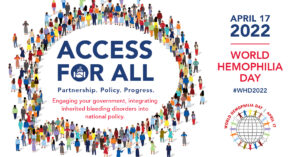
April 17, 2022 is World Hemophilia Day. The theme of the event this year is “Access for All: Partnership. Policy. Progress. Engaging your government, integrating inherited bleeding disorders into national policy”. This important event is about bringing the global bleeding disorders community together. By raising awareness and bringing hemophilia and other inherited bleeding disorders to the attention of policymakers, we can increase sustainable and equitable access to care and treatment. The world continues to be affected by the COVID-19 pandemic and the conflict in Ukraine, but one thing hasn’t changed: we are still in this together, and we will always be stronger together as a community in our shared vision of “Treatment for All”.
“World Hemophilia Day is day for people who have been affected by a bleeding disorder—either because they have one, or because they care for someone who does. But we can’t forget that governments play a critical role. It’s important that they recognize bleeding disorders and assist people who have a condition in their countries.”
— Cesar Garrido, WFH President
About hemophilia and other bleeding disorders
In people with bleeding disorders, the blood clotting process doesn’t work properly, with the result that they can bleed for longer than normal, and some people may experience spontaneous bleeding into joints, muscles, or other parts of their bodies which can lead to developmental and permanent mobility issues. The overwhelming majority of people living with inherited bleeding disorders around the world still do not have access to diagnosis, treatment and care.
To learn more about World Hemophilia Day, please visit wfh.org/world-hemophilia-day.
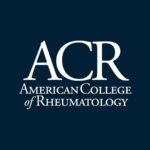 The American College of Rheumatology (ACR) has established a new guideline for Rheumatologists treating Kawasaki Disease which is a rare inflammatory disease characterized by an acute febrile, systemic, self-limiting, medium-vessel vasculitis primarily affecting children.
The American College of Rheumatology (ACR) has established a new guideline for Rheumatologists treating Kawasaki Disease which is a rare inflammatory disease characterized by an acute febrile, systemic, self-limiting, medium-vessel vasculitis primarily affecting children.
Read the new guideline here.
Sorry, this entry is only available in Bulgarian.
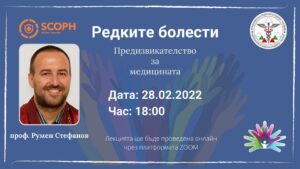 On February 28 – the Rare Disease Day, prof. Stefanov will present a talk on “Rare Diseases – a Challenge to the Medicine”
On February 28 – the Rare Disease Day, prof. Stefanov will present a talk on “Rare Diseases – a Challenge to the Medicine”
28.02.2022, 18:00 hrs
Join trough Zoom: https://zoom.us/j/93549789437
Pass code : 93549789437
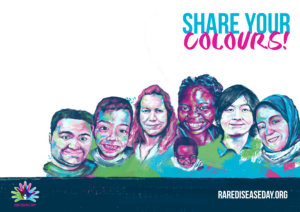 Plovdiv is supporting Rare Disease Day 2022! Raising awareness and generating change for people with a rare disease, their families and carers! Join us and Share Your Colours on 28 Feb.!
Plovdiv is supporting Rare Disease Day 2022! Raising awareness and generating change for people with a rare disease, their families and carers! Join us and Share Your Colours on 28 Feb.!
Training on strategies to foster solutions of undiagnosed rare disease cases, 11-13 April 2022
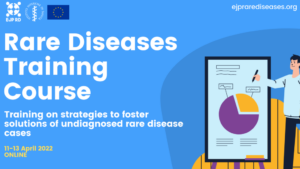 A course titled “Training on strategies to foster solutions of undiagnosed rare disease cases”, will take place ONLINE from 11-13 April 2022. It is an international training course regarding undiagnosed rare diseases organised by Istituto Superiore di Sanità (ISS), in collaboration with the Partners of the European Joint Programme on Rare Diseases (EJP RD).
A course titled “Training on strategies to foster solutions of undiagnosed rare disease cases”, will take place ONLINE from 11-13 April 2022. It is an international training course regarding undiagnosed rare diseases organised by Istituto Superiore di Sanità (ISS), in collaboration with the Partners of the European Joint Programme on Rare Diseases (EJP RD).
This initiative is part of a series of training activities included in the framework of the EJP RD, an EU funded project that counts ISS among its partners. The aim of the project is to develop a sustainable ecosystem allowing a virtuous circle between rare disease care, research and medical innovation. For more info on EJP RD please see https://www.ejprarediseases.org/
The training course is open to the international research community, to clinicians and to medical specialists who have experience and concrete interest in research and diagnosis on rare diseases. During the training course useful instruments and tools that have been validated at international level will be illustrated to the participants through the presentation of a selected number of use cases.
Moreover, the course will facilitate networking among professionals involved in the field of rare diseases.
The course official language is English.
Given the emergency of the Covid-19 pandemic the training course will be held ONLINE.
The course is free of charge. The course organisers will not cover the costs for the participation to the training course in any case.
Registration is open until 6 March 2022. Online registration is available at the following LINK.
For updated information on the training course and for the Programme, please visit the website at the following LINK.
Late debut epileptic syndrome associated with schizencephaly in normal neuropsychological development
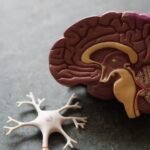 Schizencephaly is a rare disorder of cerebral cortical development with a frequency of 1.54 / 100,000. It is caused by defective migration of neurons with the subsequent formation of fissures extending from the pia mater of the cerebral wall to the underlying ventricular surface. It is often associated with other brain abnormalities such as polymicrogyria, pachygyria, ventriculomegaly, heterotopia of the gray matter, agenesis of the septum pellucidum, agenesis of the corpus callosum and others. It is most often accompanied by mental retardation, learning difficulties and epileptic seizures.An atypical case of late epileptic onset in a 21-year-old man with normal neuropsychiatric development due to schizencephaly and agenesis of the septum pellucidum is presented.
Schizencephaly is a rare disorder of cerebral cortical development with a frequency of 1.54 / 100,000. It is caused by defective migration of neurons with the subsequent formation of fissures extending from the pia mater of the cerebral wall to the underlying ventricular surface. It is often associated with other brain abnormalities such as polymicrogyria, pachygyria, ventriculomegaly, heterotopia of the gray matter, agenesis of the septum pellucidum, agenesis of the corpus callosum and others. It is most often accompanied by mental retardation, learning difficulties and epileptic seizures.An atypical case of late epileptic onset in a 21-year-old man with normal neuropsychiatric development due to schizencephaly and agenesis of the septum pellucidum is presented.
Read the full article here.
